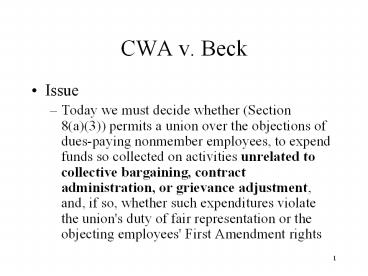CWA v. Beck - PowerPoint PPT Presentation
1 / 9
Title:
CWA v. Beck
Description:
... a union over the objections of dues-paying nonmember employees, to expend ... Courts have jurisdiction over DFR and First amendment claims ... – PowerPoint PPT presentation
Number of Views:61
Avg rating:3.0/5.0
Title: CWA v. Beck
1
CWA v. Beck
- Issue
- Today we must decide whether (Section 8(a)(3))
permits a union over the objections of
dues-paying nonmember employees, to expend funds
so collected on activities unrelated to
collective bargaining, contract administration,
or grievance adjustment, and, if so, whether such
expenditures violate the union's duty of fair
representation or the objecting employees' First
Amendment rights
2
Procedural/Jurisdictional Issues
- Board preemption of 8(a)(3) charge under Garmon
not applicable here where - Courts have jurisdiction over DFR and First
amendment claims - Union has based its defense on these claims on
8(a)(3)
3
Section 8(a)(3)
- Authorizes union shop provisions requiring
membership in the union as a condition of
employment - Membership is financial core
- Only payments (dues and fees) required
- not allegiance
4
Funds Collected Under Union Shop Provisions
- Same as RLA (Street case)
- Limited to collective bargaining, etc.
- May not be used for political purposes, social
purposes, etc. - Rationale for union shop authorization is free
rider problem - Anything unrelated to free rider outside of
permissible scope of union shop under 8(a)(3)
5
- Eleventh. Union security agreements check-off
- . . . any carrier or carriers as defined in this
chapter and a labor organization or labor
organizations duly designated and authorized to
represent employees in accordance with the
requirements of this chapter shall be
permitted(a) to make agreements, requiring, as a
condition of continued employment, that within
sixty days following the beginning of such
employment, or the effective date of such
agreements, whichever is the later, all employees
shall become members of the labor organization
representing their craft or class Provided, That
no such agreement shall require such condition of
employment with respect to employees to whom
membership is not available upon the same terms
and conditions as are generally applicable to any
other member or with respect to employees to whom
membership was denied or terminated for any
reason other than the failure of the employee to
tender the periodic dues, initiation fees, and as
assessments (not including fines and penalties)
uniformly required as a condition of acquiring or
retaining membership.
6
Holding in Beck (Brennan w/Rehnquist, While,
Marshall, Stevens)
- We conclude that 8(a)(3), like its statutory
equivalent, 2, Eleventh of the RLA, authorizes
the exaction of only those fees and dues
necessary to performing the duties of an
exclusive representative of the employees in
dealing with the employer on labor-management
issues. - What is incorporated in the definition of duties
of an exclusive representative of the employees
in dealing with the employer on labor-management
issues?
7
What is a Collective Bargaining Expense?
- Organizing expenses may be included in collective
bargaining expenses (UFCW Local 1036 v. NLRB, CA
9, 2002, Docket No. 99-71317) - Deference to Board decision and expertise on
industrial relations matters - organizing done in same competitive market
- TCE of nonunion competitors employees germane to
unionized ees.
8
Can Notification of Beck Rights Be Required by
Exec. Order?
- A presidential executive order dated April 18,
2001 which requires federal contractors to post a
notice informing employees of their right to
refuse to pay dues and fees greater than those
necessary for bargaining is enjoined
(UAW-Employment and Training Corp v. Chao,
January 2, 2002, D.C. D.C., Civ. Action
01cv00950) - Inconsistent with, and preempted by, NLRA
9
Dissent (with partial concurrence) Blackmun w/
OConnor, Scalia
- Nothing in statute or legislative history that
suggests that Congress attempting to limit how
dues collected through a union shop could be
expended - Congress concerned only about
- closed shop
- Arbitrary and discriminatory denials of
membership in the union































